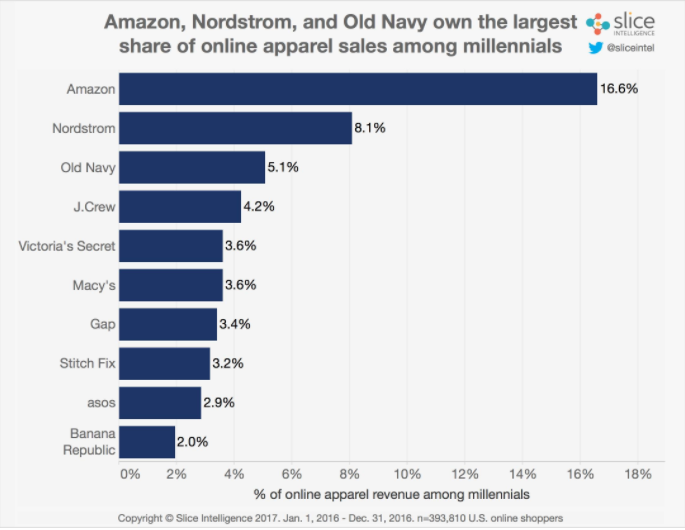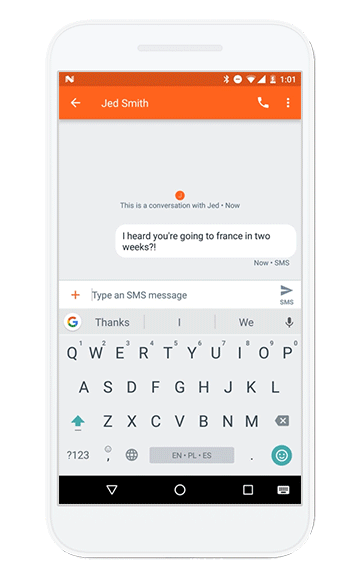10 Second Takeaway: Google employees said this week that they are now making up to three changes daily to their ranking formulas. Google is also slowly stopping its announcements about those changes.That means that search engine results have a new norm: fluidity and volatility. The days of a “Panda” or “Penguin” change are gone, replaced by daily changes and tweaks to the live rankings.
We also learned that Amazon is the new clothing destination for millennials and that your Internet provider may soon be selling your browser history without any way for you to opt out.
Spotlight on Digital Retail
Amazon is the destination of choice for clothes shopping millennials according to research firm Slice Intelligence. The company has opened up a lead more than twice that of its closest competitor. Remember that Amazon is thus the measure people use when considering how easy it is to shop at your organization’s site–and not just for clothes. They own digital retail.
Google announced this week that its Google Trusted Stores program is ending. There will be a new program called Google Customer Reviews, but stores in the new program will not be certified or have Google-backed purchasing protection.
Our Take: Google does not want to be in the retail space and certify the sales and customer service of local bricks-and-mortar stores. That’s understandable, but the company still values having a relationship with those businesses. That’s why they use agencies like ours to interact with local businesses. One way is through the Get Your Business Online program.
Read more: Amazon clothes at Recode, Google Stores at Exclusive Concepts, Slice Intelligence
Spotlight on Online Privacy
Twenty-one Republican Senators introduced legislation that allows companies providing Internet services to sell or share consumer web browsing data. The resolution is only 60 words long and says that the FCC’s rules requiring customer notices and their permission “have no force or effect”. The resolution was sent to committee. Any company providing Internet to homes or businesses can build profiles of individual users if the resolution eliminates the FCC rules.
There is a free new guide from the Electronic Frontier Foundation (EFF) that describes individual rights regarding phones and computers and other electronic devices at U.S. border inspections. The guide also has a wallet-sized cutout that reminds U.S. citizens that they must be allowed to enter the country. Your device can be seized by customs officials if you refuse to provide access. If you do provide access, agents may read and copy personal data. Read more at the EFF website.
Our Take: This is new ground for everyone. Talk with your representatives in Congress if you disagree with either action. You can call (202) 224-3121 and an operator will connect you with your representatives.
Read more: H.J. Res. 86 eliminating online consumer privacy (pdf)
Digital Citizen: New Tools for You & Your Organization
For You: The updated Gboard for Android devices has GREAT voice recognition, support for right-to-left-languages, and free themes.
For Your Organization: CAPTCHAs are those little squiggly numbers and letters you type when submitting some forms. They changed to checking a box that reads “I am not a robot”. Now Google says it can do the same thing invisibly with an updated version of reCAPTCHA.
For Both: Tiny Mails is a free Chrome extension that displays a word count in Gmail along with an estimated time for someone to read what you’ve written. The author is hoping to end long emails.


